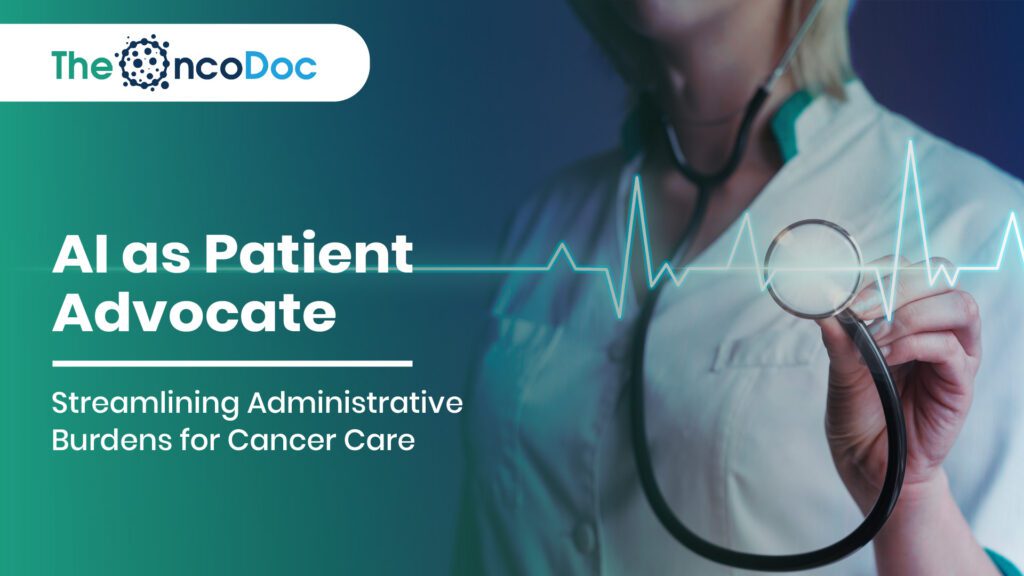A Pharma Marketing Perspective on Prior Authorizations, Scheduling, and Workflow Efficiency
Introduction: Redefining Oncology Care Through AI Advocacy
The oncology landscape is evolving rapidly, with artificial intelligence (AI) emerging as a powerful ally for patients, caregivers, oncologists, and healthcare systems. In an era where cancer care is increasingly personalized yet burdened with complex administrative workflows, AI is not just a technology but a patient advocate, helping to eliminate inefficiencies that delay treatment.
Cancer patients today face daunting challenges beyond their diagnosis: securing prior authorizations for medications, navigating multiple appointments, and coordinating with numerous specialists. Pharma companies are now stepping into this gap, leveraging AI to simplify workflows and deliver a seamless experience. By positioning themselves as facilitators of care access rather than just product providers, pharma brands can build trust, accelerate treatment timelines, and deliver measurable impact.
This article explores how pharma marketers can harness AI to improve cancer care workflows, focusing on three core areas: prior authorizations, appointment scheduling, and operational efficiency.
1. The Growing Administrative Burden in Cancer Care
The complexity of oncology care often creates barriers to timely treatment:
- Prior Authorization Delays: Insurance requirements often cause delays of 7–14 days, impacting treatment initiation for aggressive cancers.
- Coordination Challenges: Patients often juggle multiple oncologists, imaging specialists, and lab appointments, leading to confusion and missed visits.
- Systemic Strain: Oncology teams face burnout as administrative tasks consume valuable time that could be used for direct patient care.
Pharma companies, traditionally focused on drug promotion, are now reimagining their role as advocates for system-level change. AI-powered tools represent the next frontier in oncology pharma marketing, providing tangible support that resonates with both clinicians and patients.
2. Pharma Marketing’s Shift: From Product-Centric to Care-Focused
Modern oncology marketing is not limited to brand awareness; it integrates services and support systems that directly address patient pain points. Pharma companies are:
- Developing AI-based prior authorization assistants that reduce paperwork.
- Offering centralized scheduling platforms to ensure smooth care journeys.
- Educating patients and providers about these services to create lasting brand trust.
This change is in line with a larger trend in healthcare marketing that places more emphasis on value creation than transactional promotion. When brands successfully include AI-powered patient advocacy into their marketing, they transform from impersonal entities into dependable partners.
3. AI in Prior Authorizations: Speeding Access to Life-Saving Care
Prior authorization is one of the most criticized administrative hurdles in oncology. AI tools can revolutionize this process by:
- Automating Documentation: AI extracts relevant patient data from EHRs and formats it for insurance submissions.
- Predictive Approval Models: Algorithms anticipate insurer approval requirements, reducing back-and-forth communication.
- Workflow Integration: AI platforms interface with payers, pharmacies, and hospitals in real-time, slashing approval wait times.
For pharma companies, developing branded AI authorization portals positions them as problem-solvers for oncologists, directly improving treatment timelines and reinforcing trust.

4. Appointment Scheduling Optimization: A Seamless Experience
AI-powered scheduling platforms reduce patient stress by:
- Dynamic Appointment Matching: AI determines the best times by analyzing patient location, urgency, and physician availability.
- Proactive Rescheduling: Automated reminders help patients reschedule missed appointments quickly.
- Integrated Cancer Care Calendars: Platforms consolidate lab work, imaging, and consultations in a single dashboard.
Pharma companies can integrate these platforms into their patient support programs, highlighting their commitment to holistic cancer care.
5. How AI Enhances Workflow Efficiency for Oncology Teams
Physician fatigue and patient discontent are caused by administrative responsibilities. AI tools address these challenges by:
- Automating repetitive tasks such as insurance queries and appointment confirmations.
- Enabling oncology nurses and staff to focus on emotional support and clinical care.
- Providing real-time dashboards that track patient treatment timelines, ensuring fewer delays.
Brands that champion these AI tools create a narrative of empathy and advocacy, elevating their value proposition.

6. Pharma Marketing Strategies Leveraging AI Advocacy
By using AI advocacy technologies into campaigns, pharmaceutical marketers can benefit from them:
- Brand Positioning: Highlighting AI-driven platforms as integral to patient support programs.
- Content Creation: Producing educational videos on how to navigate insurance hurdles using AI portals.
- Healthcare Partnerships: Collaborating with hospitals and insurers to integrate AI systems into oncology workflows.
- Patient-Centric Messaging: Using storytelling to showcase patients who accessed timely treatment thanks to these innovations.
7. Hyper-Personalization: From Awareness to Action
AI-driven personalization makes ensuring cancer campaigns speak to patients’ needs:
- Tailored Insurance Guidance: AI chatbots can guide patients through insurance eligibility based on their diagnosis and location.
- Custom Scheduling Notifications: Messaging platforms send reminders in regional languages, improving attendance rates.
- Behavioral Insights: Campaigns adapt based on patient engagement, shifting focus from awareness to actionable support.
8. Piecing Together the Pharma Value Chain with AI
Pharma companies are leveraging AI advocacy beyond patient-facing tools to enhance backend processes:
- Sales Team Enablement: Field representatives use AI dashboards to understand local patient challenges and promote relevant solutions.
- HCP Education: AI-driven CME programs train oncologists on navigating administrative workflows more efficiently.
- Market Differentiation: Pharma companies offering support solutions gain a competitive edge in crowded oncology markets.

9. AI-Enabled Patient Advocacy Portals
Intelligent digital platforms are replacing manual helplines in patient advocacy:
- Real-Time Assistance: AI chatbots answer insurance and scheduling queries instantly.
- Multi-Language Capabilities: These tools cater to regional and rural populations.
- Seamless Integration: Patients can upload documents, schedule appointments, and receive reminders in one portal.
Such initiatives position pharma companies as patient-first advocates.
10. Reducing Burnout Among Oncology Teams
Burnout among oncology staff is a growing concern. Pharma brands supporting AI adoption indirectly improve workforce morale:
- AI triages repetitive questions, allowing clinicians to focus on patient care.
- Streamlined workflows lead to fewer missed appointments and crises.
- Staff satisfaction improves, enhancing collaboration with pharma partners.
11. The Role of Predictive Analytics
Predictive analytics ensures proactive care management:
- Identifying bottlenecks in insurance approvals.
- Forecasting high-demand periods for imaging centers or oncology consultations.
- Enabling pharma teams to target educational campaigns in regions with systemic delays.
12. Marketing ROI Through Patient Impact
Instead of vanity metrics, oncology pharma brands now measure impact through:
- Reduction in average time-to-treatment initiation.
- Patient satisfaction and navigation success rates.
- Provider adoption of AI tools offered by the brand.
These metrics reflect genuine contributions to better health outcomes.
13. Collaborative Ecosystem Models
AI-driven advocacy thrives in ecosystems built on partnerships:
- Pharma brands collaborate with payors to simplify approval processes.
- Smooth data flow is ensured by integration with EHR providers.
- Co-marketing campaigns with oncology associations build trust and visibility.
14. Storytelling as a Marketing Lever
Storytelling remains vital in positioning pharma companies as care advocates:
- Showcasing survivors who accessed timely treatment due to AI-powered authorization tools.
- Sharing oncologist testimonials on how these systems reduced their workload.
- Producing short-form content on patient navigation success stories.
15. Ethical and Regulatory Considerations
AI-powered pharma advocacy solutions must meet rigorous ethical and regulatory standards:
- Data Security Compliance: Adhering to HIPAA and other privacy regulations to protect patient information.
- Transparency in AI Use: Clearly explaining AI’s role in recommendations and decision-making.
- Unbiased Support Tools: Ensuring patient assistance platforms remain neutral and non-promotional.
These safeguards enhance trust, demonstrate integrity, and position pharma companies as responsible leaders in oncology care innovation.
16. Overcoming Technology Gaps in Emerging Markets
In underserved regions, pharma companies can bridge technology divides by:
- Launching Low-Bandwidth AI Tools: Offering chatbots that function on basic networks for rural communities.
- Partnering with NGOs: Driving digital literacy programs to help patients use oncology support platforms effectively.
- Implementing Voice-Based Scheduling: Overcoming literacy barriers with intuitive, voice-driven appointment systems.
These initiatives create equitable access to cancer care resources, ensuring no patient is left behind due to technological limitations.
17. Real-Time Dashboards for Pharma Marketers
AI-powered dashboards provide pharma marketers with actionable, real-time insights to enhance oncology campaigns:
- Authorization Impact Tracking: Monitor how AI-driven tools reduce prior authorization delays, showcasing measurable improvements in patient access.
- Regional Need Mapping: Identify underserved areas with high patient demand or limited oncology resources to guide targeted interventions.
- Operational Efficiency Insights: Pinpoint hospitals or clinics with scheduling bottlenecks, enabling focused outreach and resource allocation.
These dashboards transform marketing strategies from reactive to proactive, helping brands align campaigns with real-world patient needs while reinforcing their role as innovation leaders in cancer care delivery.
18. Gamification of Patient Navigation
Gamification brings a layer of motivation and interactivity to AI-driven patient support systems:
- Incentivized Documentation: Patients earn points for completing insurance and authorization paperwork ahead of time.
- Engagement Badges: Recognition is awarded for attending scheduled oncology consultations, encouraging treatment adherence.
- Platform Rewards: Consistent use of pharma-branded support portals unlocks rewards, strengthening engagement and brand trust.
By making complex administrative processes feel simpler and more engaging, gamification improves patient participation while highlighting the value of pharma’s digital tools. This strategy fosters a supportive care environment that empowers patients to stay proactive throughout their cancer journey.
19. Pharma’s Role in Building Trust
Pharma companies have an unprecedented opportunity to build trust by going beyond drug delivery and actively addressing systemic barriers in oncology care.
- Championing Patient Advocacy: By removing administrative pain points such as prior authorization delays and complex scheduling, pharma brands position themselves as true partners in patient care rather than transactional product providers.
- Fostering Stronger Collaborations: Strengthening relationships with oncologists, insurers, and caregivers through integrated support programs reinforces their role as a central pillar in the cancer care ecosystem.
- Driving Innovation and Leadership: By investing in AI-driven tools and forward-thinking solutions, pharma companies can establish themselves as thought leaders who not only provide treatments but also create a smoother, more compassionate patient journey.
This shift from product-centric marketing to care-driven advocacy builds long-term loyalty, enhances credibility, and sets a new benchmark for empathy and excellence in oncology care.
20. Future-Proofing Oncology Care Workflows
The future of oncology care will be defined by intelligent, interconnected systems designed to eliminate administrative barriers and accelerate treatment delivery.
- AI-Integrated Authorization Systems: Universal platforms connected with insurers will automate prior authorizations, reducing approval times from days to hours and ensuring patients access therapies faster.
- Smart Scheduling Solutions: Real-time availability engines will coordinate appointments across specialists, imaging centers, and labs, minimizing wait times and improving care continuity.
- Predictive Patient Apps: Mobile applications equipped with AI will send proactive reminders about paperwork, insurance coverage, and upcoming consultations, reducing missed appointments and improving preparedness.
Pharma companies that invest in these innovations will not only streamline workflows but also establish themselves as leaders in patient-centered care. By setting new benchmarks for operational excellence and access, they can shape a future where oncology treatment journeys are seamless, supportive, and efficient for every patient.
Conclusion
AI has evolved far beyond its initial role as a promotional tool, emerging as a powerful patient advocate and a driving force in reshaping cancer care. By targeting critical administrative challenges such as prolonged prior authorization processes, fragmented scheduling systems, and increasing clinician burnout, pharma companies can redefine their role in oncology ecosystems. Instead of being seen solely as suppliers of medication, they can establish themselves as trusted care enablers who actively contribute to smoother patient journeys and faster access to life-saving treatments.
The integration of storytelling, strategic partnerships, predictive analytics, and intelligent technology solutions allows brands to build a marketing approach rooted in empathy, efficiency, and impact. With AI-driven workflows, oncology care becomes not only faster but also more patient-centered, giving individuals and care teams the support they need at every stage. In a healthcare landscape where every delay carries significant consequences, companies that take the lead in breaking down systemic barriers and championing patient advocacy will stand apart as industry innovators. The future of oncology pharma marketing belongs to organizations that blend cutting-edge technology with human understanding, creating a new standard where care delivery is seamless, compassionate, and deeply aligned with patient needs.
The Oncodoc team is a group of passionate healthcare and marketing professionals dedicated to delivering accurate, engaging, and impactful content. With expertise across medical research, digital strategy, and clinical communication, the team focuses on empowering healthcare professionals and patients alike. Through evidence-based insights and innovative storytelling, Hidoc aims to bridge the gap between medicine and digital engagement, promoting wellness and informed decision-making.



